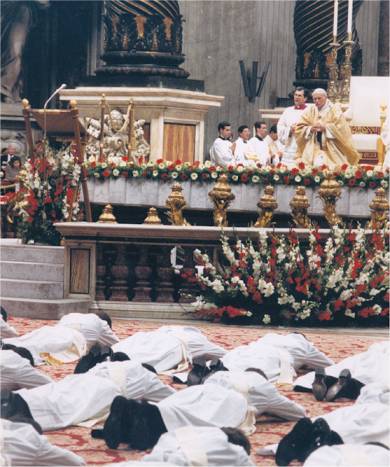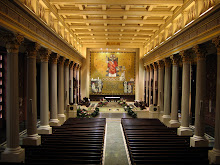This week's Catholic Telegraph is the annual Vocations issue. Within, there are two 'personal journey' stories, one on Dan Hess, a First Year Seminarian for the Archdiocese, and the other on Sr. Rebecca Marie, who is with the Sisters of St. Joseph.
I also have an article included in respose to letters in last week's Telegraph, which follows:
The question of who has a ‘right’ to the priesthood has been a hot topic of late. According to the theology of the Church, however, no one has a ‘right’ to be ordained; it is an individual’s response to an invitation by Christ to serve His Church. Therefore, the Church has the obligation to define who is eligible for this Sacrament, which must be done in a consistent manner with the Church’s Tradition. This teaching has been concretely defined, in a consistent manner with the Tradition, over the last thirty years.
In 1976, Paul VI published the official teaching in Inter Insigniores. He explains that female ordination only occurred with early Gnostic heretics and Church Fathers condemned it, that Christ didn’t call women to the Twelve, though He often broke traditions of the time regarding women, and that the Apostles reserved many Church roles to men. He acknowledges some traditions, like requiring women wear veils, have been lifted. But, just as the Church cannot change from using bread and wine at Mass, restricting priesthood to men has sacramental sign-value and is unchangeable: "This norm, based on Christ's example, has been and is still observed because it is considered to conform to God's plan."
In 1994’s Ordinatio Sacerdotalis, John Paul II further clarifies "in order that all doubt may be removed, ...I declare that the Church has no authority whatsoever to confer priestly ordination on women and that this judgment is to be definitively held by all the Church's faithful. (4)"
Finally, it is to be noted that Vatican II, in Lumen Gentium, calls for the faithful to submit to the teachings of the Church on faith and morals, which is spoken through the voice of the pope, in union with the College of Bishops. Pope John Paul II and (then) Cardinal Ratzinger were clear that this issue was in such a category.
If you are a man who feels called to the priesthood, I invite you to call me at 513-421-3131, or visit cincinnativocations.org. The documents cited in this article, as well as an extended discussion of this topic, can also be found at the same address.
Thursday, January 11, 2007
Subscribe to:
Post Comments (Atom)










3 comments:
Father,
Kudos on your succinct and definitive response in the Catholic Telegraph.
The fact that the priesthood was instituted by Christ in a manner that respects and encourages the ontological differences between men and women was never an issue for me in my early life. My experiences were with good priests and happy women religious (in my family, in the parishes, at college, etc.).
It was when I went to ND that suddenly--in the pages of the student paper and in the discussions around campus--the nature of the male priesthood was attacked. I had not given it much thought and honestly I did not have easy answers for people.
During the first couple months that I was at ND, Francis Cardinal George of Chicago came to campus to give a nice little talk. I honestly forget the main topic, but there was a time for Q&A at the end. I (naively, innocently, etc.) asked this great prelate--with the very first question of the evening: (in so many words) "People around campus are lobbying for women in the priesthood. This is new and perplexing to me. How do we respond to those who say that women should be ordained?"
Unexpectedly, Cardinal George first turned the question back to me. "Everyone has an opinion on controversial matters. What is your opinion?" I managed to sputter out "Well, people question a lot of what the Church says, but I think they have it right on this."
All of this is build up, I suppose, to what Cardinal George said next (this is from memory and not a true direct quote): "If you look at this as a matter of 'justice' or 'fairness' in the secular sense, then people are right to be upset. Women and men have equal dignity. We know that women can do many of the same things that men can do just as well, if not better. From the Church's perspective, though, we are not dealing with a matter of secular justice or equality. The priesthood is the domain of the sacred, and it was given its characteristic by the original--and eternal model--priest: Christ."
I think he fleshed this out a little bit more, but that’s the idea. I just find it helpful to keep in mind that yes, this does appear "unjust" or archaically unequal to people working from a secular viewpoint. Their indignation is understandable: the distinction that makes all the difference is what you pointed out--Christ and the apostolic Church that he instituted definitively imparted the nature of the priesthood.
I look forward to the future mining and explaining of John Paul II's "Theology of the Body," as well, because I really believe that the greater understanding of what it means to be "male" and "female" persons will prove to be unbelievably rich ground for the understanding of this issue.
Enough--sorry for the long post!
Briefly--part of what needs to be better-explained (and I obviously felt it worth of a follow-up post to say this) is how women are called to live out their vocations and faith in the Church. There is no question that this is entirely missed by most people. I think it is also an under-developed (or at least under-promoted) area of catechesis.
How does the "feminine genius" play itself out, practically, in the Church? How can the unique talents and traits of women be put in the service of Christ in different ways, particularly in light of the unquestionable equality of human dignity?
On another side issue, it seems like it *is* a legitimate discussion to ask whether women can and should play a larger role in Church governance. I believe that Mary Ann Glendon has recently been promoting a greater role for women in some areas of governance(did I read this in First Things???). This is an administrative realm and not Sacramental--does this offend or run contrary to the "spiritual fatherhood" that is part of the innate characteristic of the priest?
Just thought it was important to recognize these issues and areas that need attention/promotion.
Dan,
Thanks for the comments and for your willingness to be interviewed and share your story with the readers of the Telegraph as well.
I think your second post here is where the heart of the matter lies. Women do have an important and vital role in the life of the Church, as they have played throughout history. And as you point out, in the secular viewpoint, they do not seem to be getting the respect that they deserve. This is definitely a topic for further discussions, by those much more qualified than I!
Post a Comment